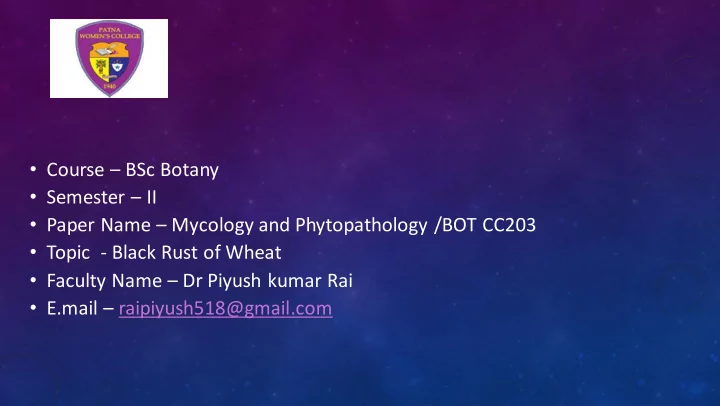

• Course – BSc Botany • Semester – II • Paper Name – Mycology and Phytopathology /BOT CC203 • Topic - Black Rust of Wheat • Faculty Name – Dr Piyush kumar Rai • E.mail – raipiyush518@gmail.com
INFECTED RUST DISEASE OF WHEAT PLANT
SYSTEMATIC POSITION OF PATHOGEN Kingdom- fungi Division- Eumycota Class – Basidiomycetes Order- Uredinales Family – Pucciniaceae
PATHOGEN : PUCCINIA GRAMINIS TRITICI • Rust of wheat is a very destructive disease cause enormous losses in all wheat growing region of the world . • Earliest know disease of crop plants . • Persoon (1797) first time reported that the disease is caused by a fungus .
TYPE OF RUST IN INDIA Black or stem rust – Puccinia graminis tritici Brown or orange rust – Puccinia recondita Yellow or stripe rust – Puccinia striiformis
WHEAT RUSTS
SYMPTOM • Symptom are produce on almost all aerial parts of the wheat plant but are most common on stem , leaf sheaths and upper leaf surface . • Pustules are dark reddish brown occur on both sides of the leaves ,on the stem and on the spike . • Pustules are usually separate and scattered .
SYMPTOM • Prior to pustules formation, flecks may appear . • As the spore masses break through , the surface tissue take on a ragged and torn appearance.
FAVOURABLE CONDITIONS • Moisture and temperature above 20 °C flavour the development of disease.
CAUSAL ORGANISM • Puccinia graminis tritici is the causal organism. • It is an obligate parasite . • In life cycle Two type of mycelia are Dikaryotic and Monokaryotic • The dikaryotic mycelium occurs in the primary host ie. Wheat plant . • The Monokaryotic mycelium occurs in the alternate host ie. Barbery bushes.
STAGE OF THE PATHOGEN • Stage 0 – Spermagonium • Stage 1 – Aecium • Stage 2 – Uredium • Stage 3 - Telium • Stage 4 – Basidium
MODE OF SPREAD • Primary spread : Wind borne are Uredinospore and Aeciospores • Secondary spread: Rain is necessary for effective deposition of uredinospore • Teliospores : with the Straw .
PRIMARY AND SECONDARY INOCULUM OF WHEAT STEM ROOT
DISEASE CYCLE
DISEASE MANAGEMENT • Eradication of complete alternate host is an important measure for the control of the disease. • Resistant varieties like NP-710 , NP-718, NP- 770, NP -809 , NP- 829, NJ- 146 AND NJ – 284 etc. • Some Mexican varieties like Sonora 63 ,64 and lerma Roja are almost completely resistance to black rust.
• Use of fungicide: sulphur Dusting • By spraying the wheat crop with parzat liquid with zinc sulphate. • Systematic fungicide like vitavax , plantvax etc. • Mixed cropping of wheat and barley is also a good measure to combat the disease.
• Thank – you
Recommend
More recommend